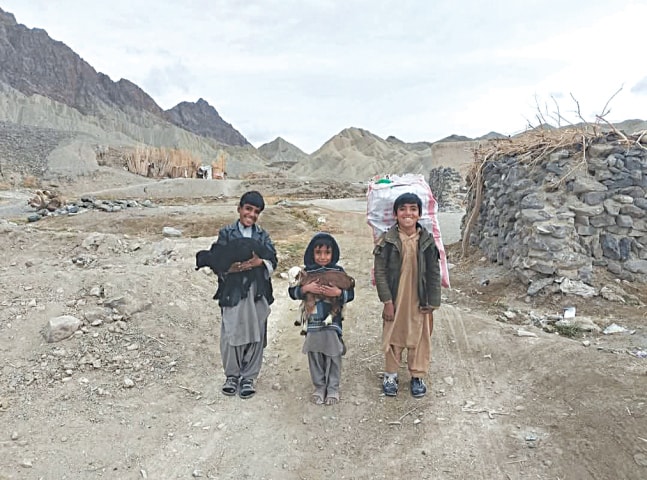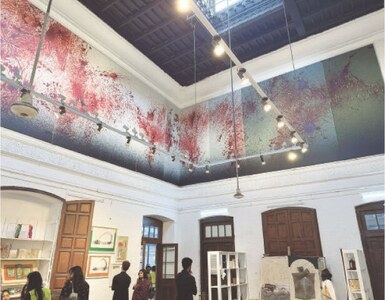
The mountainous town of Kachao is situated in the farthest corner of the Balochistan province, in district Chagai that borders Iran and Afghanistan. Chagai is also home to the multibillion-dollar copper and gold Reko Diq project which, according to a recent feasibility study, has estimated deposits worth over $60 billion.
Despite the expected windfall from the long-delayed project — the first diggers arrived in 1992, but due to legal, security and ownership issues, the mines are said to start production only by 2028 — there is a more pressing concern for the residents of Kachao.
Kachao is known for its freshwater springs, says local Hameed Baloch. “But we are worried that our water is being used for the mining project, depleting our reserves,” he tells Eos. Hameed reveals that the town’s population, spread over small hamlets and numbering in the hundreds, is dependent on agriculture and livestock, which makes the water crisis an existential issue.
“Tube wells have been installed in our area for the project, without taking the residents of Kachao on board,” says Hameed. He adds that while the area lacks basic infrastructure, roads leading to tube wells have been constructed over the years. “Where will we go when they have taken all the water from here,” asks Hameed.
In the mineral-rich deserts of Balochistan’s Chagai, multibillion-dollar mining projects promise prosperity. But for villages such as Kachao and Talaap, the reality is vanishing water, barren fields and broken promises…
A DEPLETING LIFELINE?
The problem is already apparent, with the remote areas of the district, including the district headquarter Dalbandin, struggling to get clean drinking water. It doesn’t help that Balochistan lies in a zone that generally sees low precipitation.
The province receives approximately 176 millimetres (mm) of rain annually, according to the Pakistan Meteorological Department (PMD) data, while its western parts, including the mineral-rich Chagai district, receives much less, lower than 50mm. Extreme weather events, from droughts to last year’s torrential rains, make the situation worse and have forced people to migrate.
For now, though, there is enough water in Kachao, with women and children making a short trek down the mountain to get water. But Hameed says the levels have depleted and the water has become saline in certain places.
Barrick Gold, the Canadian firm that has 50 percent stake in the project — the remaining 50 percent is split equally between the governments of Balochistan and Pakistan — does not agree. Its spokesperson, Samia Shah, tells Eos in an email that the project will only tap into a small, remote part of a larger groundwater basin, which is already too salty for drinking or farming without expensive treatment.
She adds that no communities or water sources are nearby, and the area has no wildlife relying on this water. In her response, Shah asserts that independent studies have confirmed the groundwater isn’t connected to surface ecosystems and the project won’t stop others from using the basin in the future.
Syed Fazl-e-Haider, a development analyst and author of The Economic Development of Balochistan, says a sedimentary groundwater system, about 70 km away from the project site, will be used to meet the water requirements of Reko Diq. He tells Eos that there is a need to conduct an environmental impact assessment study on the two decades of mining at the Saindak Copper-Gold Mine, located in the same district, some 90 kms away.
“The findings of such a study can reveal the potential environmental impact of extraction at Reko Diq in the next decade,” says Haider.
GOING THE WAY OF TALAAP
The small town of Talaap, situated in Chagai to the south of Taftan near the Pakistan-Iran border, has been providing water to the Saindak project for over two decades. Saindak, like Reko Diq, is a multibillion-dollar project and the Chinese have been extracting copper and gold from there for quite a few years now, since early 2000. And like Kachao, Talaap is a small town, with over 50 houses and a population of a few hundred.
Khuda Baksh Baloch, a local farmer, says the water level in Talaap has gone down.
“Before the Saindak project, the water level was at 60 feet,” he tells Eos. “Now, it stands at 100 feet and it is also saline, unlike in the past,” adds Khuda Baksh. At the same time, continues Khuda Baksh, the town has not benefitted from the bounties that the project promised, other than in the form of menial jobs.
Most locals Eos spoke to echo Khuda Baksh’s concerns, complaining of poor crops and water quality as well as infrastructural issues. One of them, Ataullah, says that they were promised the moon and more when the project authorities wanted water supply for the project.
“They have not fulfilled a single promise so far and have added to our problems instead,” Ataullah tells Eos. “Our water used to be clean and we used to cultivate wheat, among other things,” he continues. “Now, we have to travel to [the nearby town of] Washaap, which takes about half hour, to bring back water on push carts,” he adds.
DWINDLING RESOURCES, DEPARTING POPULACE
A multitude of reasons have combined to force locals from the towns of Talaap and Kachao to move elsewhere for better opportunities. It includes the building of a 32-kilometre border wall from Taftan to Talaap, curtailing job opportunities across the border. At the same time, the area remains susceptible to droughts and floods.
Zahid Mengal, who hails from Nushki, heads the not-for-profit Azat Foundation, based in Quetta. Since the early 2000s, his organisation has been carrying out relief efforts in the drought-hit districts of Chagai and Nushki, among other places. “Such droughts continue to hit parts of Balochistan, adversely affecting agriculture,” he continues. “The effects are felt slowly over the years, but they are dire,” Mengal adds.
Dr Syed Ainuddin, the head of the Disaster Management Department at the University of Balochistan in Quetta, says the scarcity of rainfall and decreasing groundwater levels, caused by deep wells pumping over the last few decades — especially in the western areas of Balochistan, where Chagai is located — is causing the drought.
In recent years, Chagai and the surrounding districts have also suffered because of torrential rains and flash floods, including last year. Experts blame climate change for the unprecedented rains and floods, especially in Chagai, which has recorded low rainfall historically.
This explains the exodus from not just Talaap, but surrounding areas as well, says Madina Bibi, an elderly matriarch from Talaap. “There is nothing here for us to survive on,” she tells Eos. “Our lands and livestock have been destroyed by the consumption of saline water,” she continues.
While she has no plans to leave, she is worried about her children’s future. “They used to go to Taftan for work. But now, unfortunately, that too has come to an end following the construction of the wall along the border,” Madina Bibi adds ruefully.
People from Talaap and Kachao continue to move elsewhere, in Balochistan as well as across the border to Iran, where they often have family. As a result, both Kachao and Talaap now wear a deserted look.
As I stood in the wind-carved valleys of Kachao, where the snow once kissed the mountain peaks and the springs gurgled with promise, the silence was haunting.
The same silence echoed in Talaap. It was not the silence of peace, but of voices left unheard, of promises unkept, of lands growing quiet as water recedes. If we do not listen now, the springs will run completely dry, the people will vanish, and all that will remain are copper dreams carved into the bones of a dying land.
The writer is a member of staff. He can be contacted at: akbar.notezai@gmail.com
Published in Dawn, EOS, June 29th, 2025


































